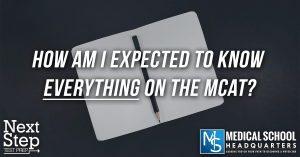
In today’s episode, we talk about what you need to know for the MCAT: How much material is actually covered? If you’re scared about the MCAT, thinking about how much of a beast it is, then it’s time to face your fears.
Today, we try to give you a sense of what the MCAT is really like in terms of its depth. Honestly, it’s not as bad as you think it is. But that doesn’t mean you can rest on your laurels. The MCAT is, indeed, a unique beast. You need to approach your MCAT prep the right way.
Listen to this podcast episode with the player above, or keep reading for the highlights and takeaway points.
The outline of the MCAT’s contents itself is 126 pages long. It’s intimidatingly broad. But the MCAT is also extremely shallow. It’s a classic example of being a mile wide but an inch deep.
Yes, you have to know physiology, physics, and organic chemistry. But you don’t have to know the level of detail that you probably had to know in your college classes.
The MCAT is a classic example of being a mile wide but an inch deep.Click To TweetMCAT prep books are much slimmer than your stack of college books. It looks like a lot when collected together, but it’s not that bad.
The MCAT doesn't expect you to know all of the nitty gritty on every topic that it wants you to know.Click To TweetYou don’t have to dig deep like your midterms or finals for your classes in undergrad. The MCAT doesn’t expect you to know all of the nitty gritty on every topic that they want you to know. So they just want you to know a little bit about all of it. Know the basics about everything.
[Related episode: What Prereqs Do I Have to Have to Take the MCAT?]
The breadth of material covered on the MCAT creates a challenge in juggling all of it at once. So you need to come up with learning techniques to help you amalgamate all different kinds of information.
In your college classes, even though it may be very information-heavy, that information is usually all related and tied together for a particular exam. The MCAT is different because it requires you to answer questions about sociology that have nothing to do with the physics you also need to be studying.
[Related episode: How to Start Preparing for the MCAT.]
It’s human psychology to want to focus on the material you’re already best at. But with MCAT prep, you need to target your weaker areas to really improve.
Challenge yourself and ask yourself, what are you the most terrified of? What subject do you dread seeing in your MCAT practice tests? What topics really scare you? Those are the things you need to start with. Focus on addressing your weaknesses in your MCAT content review.
Focus on addressing your weaknesses in your MCAT content review.Click To Tweet
Lorem ipsum dolor sit amet, consectetur adipiscing elit
I just received my admission to XXXXX! This is unreal and almost feels like I am dreaming. I want to thank you for all of your help with my application. I cannot overstate how influential your guidance and insight have been with this result and I am eternally grateful for your support!
IM SO HAPPY!!!! THANK YOU SO MUCH FOR ALL YOUR HELP, IM INDEBTED TO YOU! Truly, thank you so much for all your help. Thank you doesnt do enough.
I want to take a few moments and thank you for all of your very instructive, kind and consistent feedback and support through my applications and it is your wishes, feedback, and most importantly your blessings that have landed me the acceptance!
I got into XXXXX this morning!!!! It still has not hit me that I will be a doctor now!! Thank you for all your help, your words and motivation have brought me to this point.
I wanted to once again express my heartfelt gratitude for your help in providing feedback during my secondary applications. Your guidance has been instrumental in my journey.
Just wanted to share my wonderful news! I received my first medical school acceptance! Thank you for all that you do for us Application Academy!!!
I am excited to tell you that I just got my third interview invite from XXXXX today! I can’t believe it. I didn’t even know if I was good enough to get one, let alone three – by mid-September. Thank you so much for all of your help and support up to this point; I would not be in this position without it!!
I wanted to thank you for helping me prepare for my XXXXX interview. Even in a 30-minute advising session, I learned so much from you. Thank you for believing in me, and here’s to another potential success story from one of your advisees!
I just received an acceptance with XXXXX! This is so exciting and such a huge relief and so nice to have one of our top choice schools! I also received an interview with XXXXX which brings the total up to 20 interviews! Thank so much, none of this would have been possible without you!

Join our newsletter to stay up to date
* By subscribing you agree to with our Privacy Policy and provide consent to receive updates from our company.
Resources
Advising Services
Podcasts & Youtube
Books
About